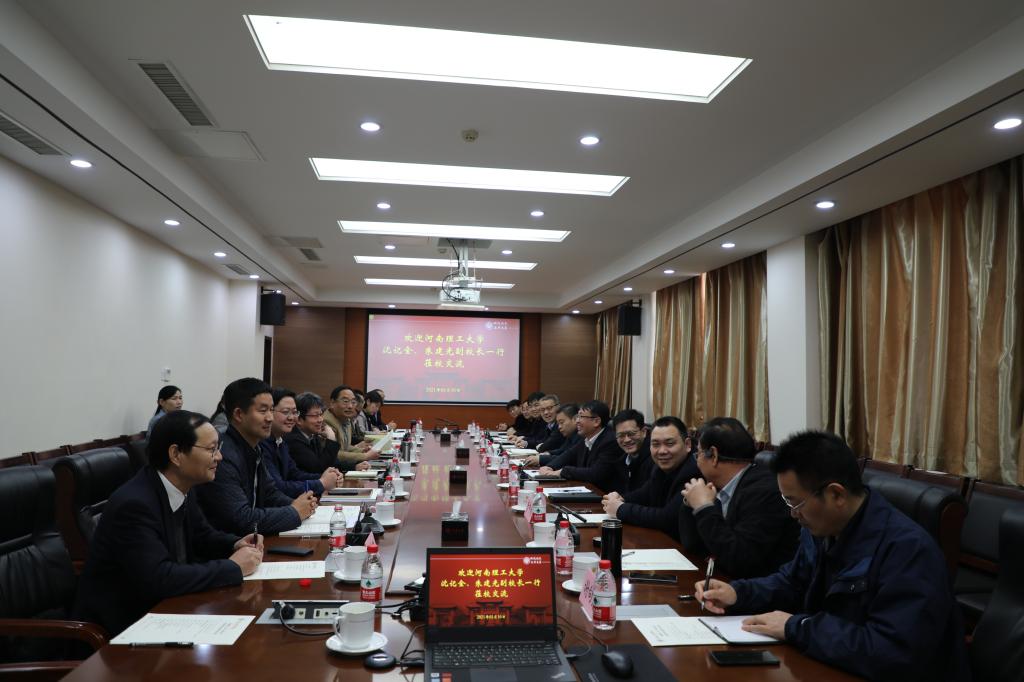
On the morning of March 16, Shen Jiquan and Zhu Jianguang, vice presidents of Henan Polytechnic University (HPU), and the heads of relevant departments of HPU came to HENU to discuss and exchange experience in medical education. Kan Yunchao, Member of the Standing Committee of the Party Committee and Vice President of HENU, Sun Junjian, Member of the Standing Committee of the Party Committee, Vice President of HENU, and Secretary of the Party Committee of Henan Medical School (HMS), and heads of the Party Committee Organization Department, Personnel Office, Academic Affairs Office, HMS and other relevant departments received the guests and held an exchange symposium in Meeting Room 208 of the Administration Building of the Jinming Campus of HENU.
On behalf of the university, Kan Yunchao extended a warm welcome to the visit of Shen Jiquan, Zhu Jianguang and their party and gave a brief introduction to the current situation of medical education in HENU. He said that building a medical school in a non-medical university is a very difficult and challenging task. How to make full use of the multidisciplinary advantages of comprehensive universities to run well medical disciplines is a challenge that HENU needs to explore at present. It is hoped that the two sides will strengthen exchanges in the future work, go hand in hand and develop together.
Shen Jiquan gave high praise of the achievements in the construction and development of HMS, and hoped to communicate with our university on the issues related to deepening medicine-education cooperation and advancing medical education reform through this symposium. He introduced the current situation of the medical education reform of HPU and the problems faced by HPU in terms of the discipline construction, organization and management, personnel positioning and teaching mode, and expressed the good wishes of the two parties to further deepen friendship and strengthen exchanges in the future.
Zhu Jianguang said that the big health vision brings new opportunities for the training of medical talents, and also puts forward new requirements. HENU has seized the reform dividend and became the leader in the reform of medical education in Henan Province. After recent years of development, it has a profound medical and humanities accumulation and rich experience in medical discipline construction. It is hoped that through this exchange, HPU can learn from the advanced experience of the century-old HENU in running medical disciplines.
Ren Xuequn, Executive Deputy Dean of HMS, briefly introduced the basic situation of the medical school from the aspects of historical evolution, development status, and future directions. It is proposed that the medical school should construct six systems including cultural value, talent training, collaborative innovation of medical education, research and production, medical services, medical education resource guarantee, and talent quality evaluation and incentives.
At the symposium, the two sides conducted in-depth exchanges and discussions on matters of medical education system mechanisms, resource allocation and talent teams.
Sun Junjian said that medical education is elite education, and medicine is multidisciplinary, is science, and even more human studies. In order to cultivate high-level medical talents with high medical ethics and exquisite medical skills, in accordance with the Opinions on deepening the coordination between medicine and education to further promote the reform and development of medical education (Guobanfa [2017] No.63) by the General Office of the State Council, HENU formally started medical education reform. Based on the experience in the reform of medical education in HENU, he put forward three suggestions: (1) to adhere to the problem-oriented approach and focus on the cultivation of medical talents, further deepen the medicine-education cooperation and advance the reform of medical education; (2) to straighten out the system and mechanism, and clarify the positioning and relationship of the medical school and its affiliated units; and (3) to combine the characteristics of engineering universities and colleges, give full play to the advantages of industry characteristics, pay attention to the medical and industrial cross-integration, and conduct dislocation development. It is hoped that the two sides will strengthen cooperation and exchanges in the construction of medical disciplines in the future, help the construction of a healthy Central Plains region, and provide strong support for local economic development.